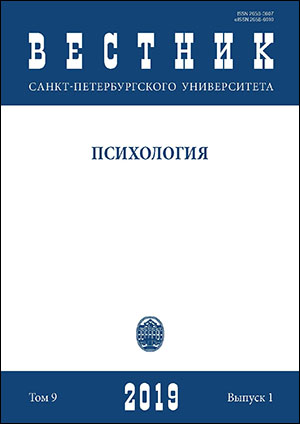Meaning-in-life state as an indicator of the personality agentive development
DOI:
https://doi.org/10.21638/11701/spbu16.2019.101Abstract
The article presents the results of theoretical and empirical research of meaning-in-life states as psychological indicators of the achieved by a person level of agency. The idea of the existence of a special class of personal development tasks, determining the formation of the agent of individual life, is substantiated. This class includes meaning-seeking, meaning-saving and meaning-realization tasks, which assume self-determination, self-preservation and self-realization of the individual as a subject of life accordingly. Theoretically and empirically grounded typology of the meaning-in-life states, which differentiate stagnation, crisis, conflict and well being state, is proposed. Based on the study of the population sample it is proved that people, experiencing different types of meaning in life state, are characterized by different levels of development of agentive traits and abilities. Stagnation state corresponds to the non-agentivity — the underdevelopment of the agent of life when the specific tasks of development are not even accepted by the individual. Crisis state corresponds with either primary non-agentivity or secondary loss of agentivity — with the breakdown in personality development caused by the lack of solution of life meaning tasks. Well-being state corresponds to the situation of developed and fully functioning agentivity when the meaning of life tasks are accepted and successfully solved by the personality. Conflict state correlates with limited agentivity, in which successfully solving the tasks of search and preservation of meaning, individual faces the inability to implement this meaning.
Keywords:
personality, agent of life, meaning-in-life tasks, meaningfulness, the meaning of life crisis, meaning-in-life state
Downloads
References
References
approach. British Journal of Psychology, 1995, vol. 86, pp. 359–375.
Downloads
Published
How to Cite
Issue
Section
License
Articles of "Vestnik of Saint Petersburg University. Psychology" are open access distributed under the terms of the License Agreement with Saint Petersburg State University, which permits to the authors unrestricted distribution and self-archiving free of charge.




